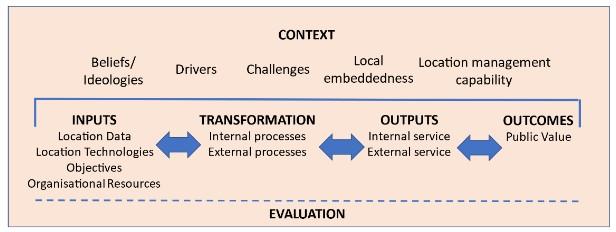[Return to ELISE's Innovative use of location data and technology to improve public services page]
This report is the state of the art overview of the project " Innovative use of location data and technology to improve public services" funded by the framework of the ELISE Action of the ISA2 Programme to explore and better understand how location data and technologies can help to deliver better public services at the local and regional levels, creating value for citizens, businesses and governments alike.
The report "Leveraging the power of location information and technologies to improve Public Services at Local Level" is based on the state of the art report and a conceptual framework
(Vancauwenberghe, et al. forthcoming) that considers what public administrations have to govern to introduce location-enabled technology in public service delivery successfully. It consists of six components: (1) context, (2) inputs, (3) transformation, (4) outputs, (5) outcomes, and (6) evaluation.

The aim of this work is to validate the conceptual framework on the use of location data and technologies in local or regional public services through a case study approach . This approach searches the replicability and scalability of the cases across local and regional governments in Europe.
The cases analysed in this report are:
- Machine Learning for Crop Recognition in the Autonomous Province of Bolzano; (Italy)
- Amsterdam Public Eye for Crowd Monitoring; (Netherlands)
- Limerick’s Fight Against Noise pollution; (Ireland)
- Cascais Operational Control Centre – Covid War Room; (Portugal)
- Ravenna’s Platform to Report issues in the city; (Italy)
- Ahrweiler Recovery after the Flood Through a different addressing system; (Germany)
- Public Domain Maintenance in the city of Leuven; (Belgium)
- Remote Areas Accessibility in Navarra; (Spain)
- Traffic Accidents Monitoring Service in Pilsen; (Czechia)
- Citizens’ Science against Pollution in Brussels Region. (Belgium)
The study suggests that location-enabled public services adoption and implementation are positively influenced by internal and expternal factors:
- the local agenda
- past choices and digitalisation efforts
- the assignment of clear responsibilities for innovation and technological capability strengthening.
Future research should address the difficulties in measuring impacts and the lack of a structured measurement culture. Limited citizens’ involvement in these services shows that co-production is still poorly addressed. The role of users and, especially, of citizens should thus be analysed in a threefold perspective: the users’ satisfaction, their experience and the usability of the service.
Download the report here
How to cite this document: Buongiorno Sottoriva, C., Nasi, G., Barker, L., Casiano Flores, C., Chantillon, M., Claps, M., Crompvoets, J., Franczak, D., Stevens, R., Vancauwenberghe, G. and Vandenbroucke, D., Leveraging the power of location information and technologies to improve Public Services at Local Level, Buongiorno Sottoriva, C. and Nasi, G. editor(s), Publications Office of the European Union, Luxembourg, 2022, ISBN 978-92-76-55777-7, doi:10.2760/452550, JRC130451.

